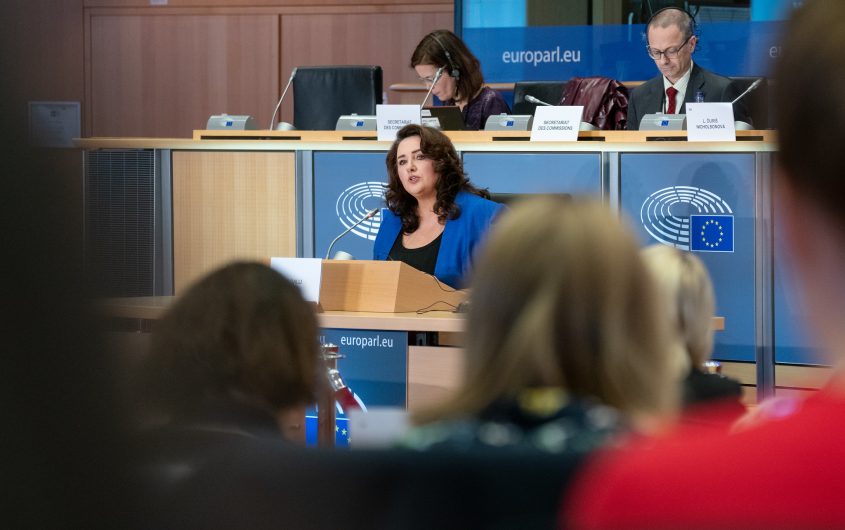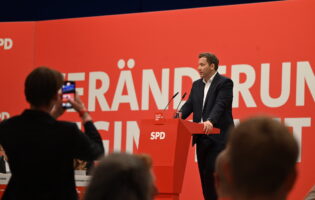
European Parliament via Flickr
The Fourth Wave of Feminism: Europe’s New Gender Equality Agenda

Joyce Mushaben
University of Missouri - St. Louis
Joyce Marie Mushaben is a Curators’ Professor of Comparative Politics and former Director of the Institute for Women's & Gender Studies (2002-2005). Fluent in German, her teaching centers on comparative public policy, the European Union, women's leadership, citizenship, immigration, mega-cities and sustainability issues. Her research covers new social movements, youth protest, German unification and identities, gender, ethnicity and welfare issues, EU migration and integration studies.
Her books/monographs include Identity without a Hinterland? Continuity and Change in National Consciousness in the German Democratic Republic, 1949-1989 (1993); From Post-War to Post-Wall Generations: Changing Attitudes towards the National Question and NATO in the Federal Republic of Germany (1998); The Changing Faces of Citizenship: Integration and Mobilization among Ethnic Minorities in Germany (2008); and, Gendering the European Union: New Responses to Old Democratic Deficits (co-edited with Gabriele Abels, 2012). Her latest book focuses on Becoming Madam Chancellor: Angela Merkel and the Berlin Republic (2016). Her articles have appeared in World Politics, Polity, West European Politics, German Politics, German Politics & Society, the Journal of Peace Research, Democratization, Politics & Religion, Citizenship Studies, Journal of Ethnic & Migration Studies, German Law Review and Femina Politica. A past president of the German Studies Association (USA), she has also served on the Executive Boards of the International Association for the Study of German Politics and the German Studies Association, as well as on selection committees for Fulbright, the German Academic Exchange Service and the American Council of Learned Societies. She is a current Editorial Board member for German Politics & Society, German Politics, and Femina Politica.
Having received a 1999 Trailblazer Award and the Chancellor's Award for Excellence in Research Creativity in 2007, Mushaben is a three-time Alexander von Humboldt Fellow, a former Ford Foundation Fellow, German Marshall Fund grantee and DAAD recipient. She has held guest-scholar posts at the Academy for Social Sciences (GDR), the Center for Youth Research (GDR), the Chinese Academy of Social Sciences and the Center for Transdisciplinary Gender Research (Berlin). She was named the first Research Associate in the BMW Center for German & European Studies at Georgetown University, has enjoyed Visiting Professorships at the Ohio State University, Berlin’s Humboldt University, the Missouri-London Program and at the Universities of Erfurt, Stuttgart and Tübingen (Germany) , inter alia. Affiliated with the American Institute for Contemporary German Politics (Washington D.C.) and a designated Fulbright Specialist, she is commonly known as "Dr. J."
Despite event cancellations fueled by corona virus concerns, the European Union launched its new Gender Equality Strategy on March 5, just in time for International Women’s Day. Long before equal treatment, positive action, and gender mainstreaming became EU household terms, suffragettes world-wide presumed that the formula “add women, voting rights, and stir” would quickly level the gender playing field across most democratic systems. But politics, as Max Weber observed, requires “the long slow boring of hard boards.” The last 100 years have given rise to three distinct feminist “waves,” each of which has conveyed specific lessons about the deeply rooted nature of male norms and gender stereotypes shaping all societal institutions. Each wave, in turn, has pushed equality activists to invent new concepts, programs, and strategies when the old ones lost their effectiveness or fell short of the larger goal of inducing structural change.
The first wave, stretching from the late 1800s to 1945, centered on women’s struggle to achieve the same rights as men, including not only the right to vote, join political parties, and run for office, but also the ability to keep or pass on their own nationality when they married. This campaign for political citizenship concentrated on equal treatment strategies.
Women quickly discovered that “same” is not “equal,” however, leading to the second wave, extending from the 1960s to the 1980s. Female citizens not only lost their names when they married; they were denied their own credit cards, bank loans, and insurance policies. European women could not hold paid jobs without their husbands’ permission; pregnant women were routinely fired. Women could not secure equal pay without equal work but were excluded from equal work because they were denied access to equal training. Biological differences between the sexes meant that women sometimes needed different treatment into order to pursue the same opportunities as men. This wave centered on the struggle for economic citizenship. After decades of exclusion and discrimination, affirmative action strategies helped females to enter new employment domains, albeit while juggling jobs and motherhood.
The third wave, running from the mid-1980s through the new millennium, initially came as a shock to white, middle-class feminists who firmly believed they were trying to make the world a better place for ALL women. The UN Decade of Women gave rise to many international conferences (Nairobi, Mexico City, Cairo, Beijing) where they were vehemently criticized for failing to incorporate big differences among women, like race, class, religion, and sexual orientation, into their goals and approaches. This wave brought the fight for social citizenship, based on a refined understanding of intersectionality. Anti-discrimination legislation and pro-active social inclusion programs provided the strategic foundation for this era.
Insisting that women deserved the same rights but often needed special policies proved rather confusing to men, leading to the exasperated response: “So what do you want to be, the same or different? Make up your mind.” Feminists contended that while treating two persons who are “the same” differently produces inequality (e.g., paying men more than women, when both hold engineering degrees), it is simultaneously true that treating two “different” conditions exactly the same (e.g., when one engineer is pregnant, the other is not) likewise engenders inequality. The best strategy in this case is gender mainstreaming, mandating the balanced participation of women and men at all stages of the decision-making process—to ensure that relevant “differences” will be incorporated into problem definitions, policy planning, and formulation; it moreover applies a gender lens to budgeting, implementation, and compliance monitoring.
Women have infiltrated the paid-labor market, mastered new occupational vocabularies, and taken on new identities as bankers, soldiers, doctors, politicians, and astronauts. The fourth wave of feminism must now focus on changing the roles of men, which I label the push for holistic citizenship. Equal participation in political, economic, and social life cannot be achieved in isolation, and nor can females enjoy full citizenship in each domain without linking the public and the private sphere, almost every hour of every day. The personal is the political for women, but for men, the political must also become the personal. Women will not secure the equal time necessary for “balanced participation” in the public sphere, until men assume their fair share of responsibility in the private sphere. Guaranteeing men paternity leave is only a small first step.
The new Gender Equality Strategy obliges the Commission to include systematically “a gender perspective in all stages of policy design in all EU policy areas, internal and external, while applying intersectionality “as a cross-cutting principle.” Commission president Ursula von der Leyen kept her first promise to the European Parliament, by forming a Commission that contains nearly equal numbers of women and men (12 women, 15 men: 44 percen). Her Mission Letters exhorted each Commissioner to “draw on all of Europe’s talents” in constituting her/his personal Cabinets, insisting that every Commission-sponsored event “feature gender-balanced panels and a broad range of perspectives from across Europe.” Commensurate with Article 8 of the Treaty on the Functioning of the European Union, each appointment letter detailed her equality expectations for the respective portfolio, inferring that the “real men” in her Commission will be just as responsible for the pursuit of equality as the strong women to whom she has assigned non-traditional dossiers. Von der Leyen is the only President in EU history to have appointed a bona fide Commissioner for Equality, Helena Dalli.
Equality advocates have learned over time that feminist theorizing is like most other sciences: advancing the cause depends a lot on trial-and-error. Discovering what does not work drives us to develop new concepts, test new approaches, and cast a wider strategic net. Like her former boss, Angela Merkel, Ursula von der Leyen rejects the feminist label, but it has only taken her 100 days to fast-forward an agenda derived from 100 years of “long, slow boring.” The EU Gender Equality Strategy 2020-2025 is a very powerful instrument reflecting the lessons gleaned across many sectors at many levels. Next comes the difficult task of securing its implementation, based on concrete timetables and indicators. Welcome to the fourth wave of feminism.









